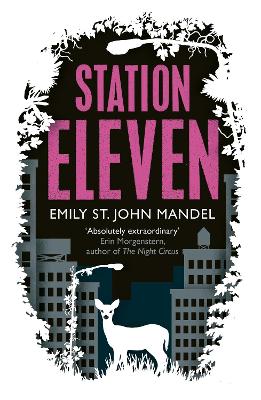Reviewed by Michael @ Knowledge Lost on
The post-apocalyptic novel has been a popular topic over the past few years. There are millions of YA novels on the topic and in the world of literary fiction it books like The Road by Cormac McCarthy, The Passage by Justin Cronin and the Maddaddam series by Margaret Atwood dominate. Recently I have read some post-apocalyptic novels that have failed to satisfy me in the way that books like The Road by Cormac McCarthy had in the past. Both California by Edan Lepucki and On Such a Full Sea by Chang-rae Lee had potential but just did not get there. Luckily Emily St John Mandel was there to restore my faith in the literary post-apocalyptic genre.
What I look for in a post-apocalyptic can be difficult to pin point. I want a dark but glittering novel that is both intelligent and audacious. It needs to do something that is different so it will be set apart from others. Station Eleven did this for me; this is not a novel about the aftermath of a global pandemic, this is about the power and importance of art. Not so much the survival of art but the importance it plays on a more personal level.
Mandel wrote a roving novel that follows a group of people struggling with life in a desolate time. This is a stylistic and complex novel told in a non-linear way to explore both the present struggles like the rarity of food and water and the disappearance of all technology. This is an exploration into individuals rather than a collective destiny. Each character has their own story to tell and the non-linear format allows their backstory to be told. They are struggling with memories, loss, nostalgia, solitude and yearning from some stability.
Canadian author Emily St John Mandel is one of those authors that receives high praises for her novels but still manages to fly mostly under-the-radar. I hate to use this term, but with all the praise from other authors she comes across as a ‘writer for writers’. Based on my experience of her writing from Station Eleven this a sad situation, her skills deserve to be realised by the reading public.
I am glad I picked up this novel; I was a little hesitant but I had heard so much about Emily St John Mandel that I just had to find out for myself. To begin with the story of Shakespearian actors was what made this different but I soon found the haunting and complex plot full of subtleties that worked in the books favour. I am still hesitant of all the new post-apocalyptic novels to come but now I know not to overlook Emily St John Mandel in the future.
This was originally posted on my blog: http://literary-exploration.com/2014/10/24/station-eleven-by-emily-st-john-mandel/
Reading updates
- Started reading
- 25 September, 2014: Finished reading
- 25 September, 2014: Reviewed
